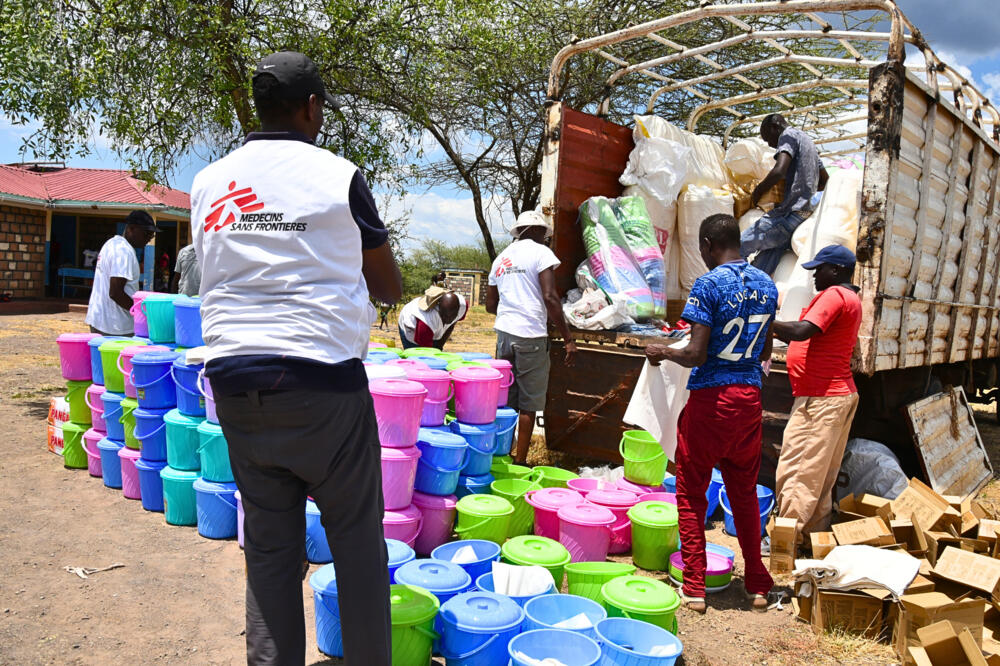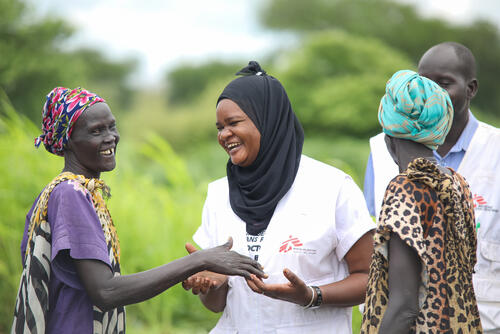Kenya: MSF tackles three simultaneous disease outbreaks in Kenya
12 November 2024
Three emergencies have broken out in regions of Kenya characterised by extreme climate conditions, prompting teams from Médecins Sans Frontières/Doctors Without Borders (MSF) to launch three simultaneous responses. The MSF teams are tackling outbreaks of malaria in Baringo and Turkana counties linked to recent heavy rains, and measles in Marsabit county. Residents of these arid or semi-arid regions often struggle to access healthcare due to the long distances to reach health centres, the high cost of transport and the difficult terrain. All three regions also suffer from serious shortages of qualified health workers.
Baringo, Rift Valley region
Parts of Baringo county have experienced a prolonged drought, followed by heavy rains. The standing water left by the rains provided a breeding ground for Anopheles mosquitoes, which spread malaria. This created favorable conditions for a spike in malaria cases from August and an increase in people admitted to hospital with complicated malaria, which can be life-threatening.
Local health services have struggled to cope, due to shortages of health staff, a lack of diagnostic tests and treatment for malaria, and the geographical challenges presented by the area, which is mountainous and has few accessible roads.
“Access to healthcare in this area is quite difficult, with some people having no health facilities within 40 kilometres,” says MSF country director Dr Edi Atte. “This means that people delay seeking care until their condition becomes critical.”
In addition, no malaria prevention activities had been carried out in the area for 5 years, exacerbating the health emergency. “The majority of people with severe malaria came from Silale ward, an area which has had no malaria prevention activities since 2019. MSF treated 3,035 people for malaria.” Says Dr Atte.
“Almost every household has a malaria case,” says Evalyn Lochomo, a mother of 6 from Nasorot village in Baringo county. “Due to the distance to the hospital, and due to the terrain, we have lost many children along this road, in this forest, where they had to leave [their bodies] in the bushes due to malaria and diarrhoea. The main reasons [for the deaths] are the distance to hospital and people’s inability to afford transport.”
To prevent these unnecessary deaths, MSF teams are working with the Baringo Ministry of Health to run mobile clinics in the region, taking medical care closer to people living in remote communities. MSF trained 26 community health promoters to test people within their local community for malaria and refer those who need it for treatment. MSF teams have also distributed 8,800 mosquito nets to help prevent malaria, as well as water purifying tablets, soap and jerry cans to help prevent waterborne diseases and promote good hygiene practices.
Evalyn’s 6 children have all received malaria treatment from MSF’s mobile clinic team, who also provided the family with bed nets to protect them from mosquito bites at night. “All my children have had malaria,” says Evalyn. “I am grateful that they all received treatment in the mobile clinics and that we now have mosquito nets.”
Turkana West, northern Kenya
In Turkana West in northern Kenya, 8 out of 10 people tested positive for malaria at its peak in September. MSF launched a response in 16 villages in the Kalobeyei area, treating 1,909 children and adults for malaria, as well as providing 2,992 outpatient consultations and extra health staff. MSF sent additional staff to Ngiitakito dispensary in Lodwar, where they also helped improve infection prevention and control measures for better management of malaria cases.
The MSF team in Turkana West also focused on providing mosquito nets to households which had not received them previously. “This area had malaria prevention interventions in the recent past,” says MSF emergency coordinator Lili-Marie Wangari. “We are helping to identify those households not reached with nets during the last net distribution carried out by health authorities.”
With most malaria patients aged between 5 and 15 years, the MSF team also installed 350 mosquito nets in a local boarding school.
Marsabit, northern Kenya
Following a measles outbreak in August in Illeret, Marsabit county, an MSF team worked with the Ministry of Health to carry out a mass vaccination targeting children aged from 9 months to 15 years. Working with 12 community health promoters, they persuaded parents to bring their children to be protected against the disease, vaccinating a total of 9,874 children. During the campaign, MSF staff also identified children with complicated forms of measles, provided them with treatment and referred patients in need of specialised care to health facilities.
In Illeret, 12 community health promoters, who live within these communities have been instrumental in the mobilization of the community to enhance reach for children from their homes to be vaccinated. "Beyond access to health facilities, mechanisms for reporting public health events within these communities by community members and volunteers are crucial for early detection of diseases and linkage to facilities for populations in these areas,” says Wangari.





